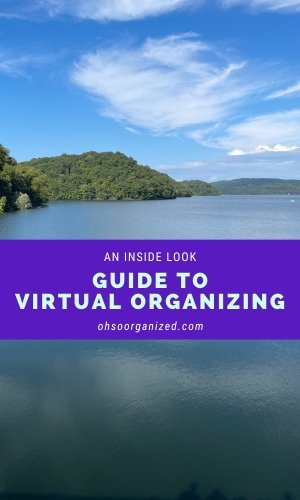When you feel disorganized, stuck, and overwhelmed, reaching out for help is beneficial. Getting support from a Virtual Professional Organizer can be the secret sauce for moving forward and living the life you crave.
You might be curious about:
How does virtual organizing work?
What is a typical virtual organizing session like?
Will virtual organizing benefit me?
This guide to virtual organizing will help you discover the answers. If you have additional questions, contact me, Linda, anytime by email at linda@ohsoorganized.com or by phone at 914-271-5673.
Virtual organizing is an extraordinary path forward. My clients love working this way. One client recently said, “It’s like putting a needle on a compass. Now I can navigate.”
How Does Virtual Organizing Work?
Session Length & Frequency
Typically, VO sessions are 60 minutes, although sometimes clients prefer 90-minute sessions.
Meeting once per week is beneficial. However, the scheduling can be customized according to your preferences.
Platform Used
Zoom is the preferred platform. However, FaceTime or the phone are alternative options.
Calendly is used to schedule VO sessions. After scheduling, Calendly emails you a Zoom link and email and text reminders before each session.
Have your phone, tablet, or laptop set up so we can see each other.
VO Rates
Clients advance purchase single hours or packages of hours.
The VO packages are beneficial because they offer savings on the hourly rate. Three, five, and twenty-hour packages are available.
Credit cards, Zelle, or Venmo are accepted.
Contact linda@ohsorganized.com for current rates.
Linda Samuels, CPO-CD®, CVOP™ - Virtual Organizing Session Ready
What is a Typical Virtual Organizing Session Like?
Session Description
Virtual organizing is a flexible, creative, collaborative process. The objective for each session is to help you make progress on your goals with compassionate, non-judgmental support.
Sessions begin by clarifying your goal for that session and reviewing how things went between sessions.
The main part of the session can include planning, assessing, decluttering, organizing, overcoming obstacles, brainstorming, supporting decision-making, or many other options.
At the end of each session, we do a quick wrap-up, discuss the “field work” you want to work on and schedule our next VO.
Pre-Session Prep
Remove as many distractions as possible- phone calls, emails, pets, and people.
Care for your personal needs before the session- hydrate, eat, and be well-rested.
Set up your digital device (laptop, phone, or tablet) so I can see you and the area we’ll work on. You’ll want to be hands-free. A stand or tripod works well.
If we are going to work on physical organizing, have some organizing supplies such as markers, sticky notes, masking tape, trash bags, bins, or boxes. These will help with sorting, donating, recycling, or re-routing.
Think about what you want to accomplish by the end of the session. Do you want help with planning, working on a project you’re stuck on, or choosing a focus? My support can vary from brainstorming to planning to “sitting” with you as a body double while you process a challenging pile. There are many possibilities.
In Between and Post Sessions
We can text or email between sessions to enhance progress and add accountability.
With VO packages of three or more hours, I create a Project Session Journal (PSJ) for both of us to reference. After each session, you receive the updated PSJ, an ongoing record of your successes, challenges, discoveries, resources, and more. It helps reinforce the changes you are making, including building new neural pathways as you establish new habits.
There will be doable, agreed-upon “field work” between sessions, enabling you to progress beyond our sessions.
“Virtual organizing is a flexible, creative, collaborative process.”
Will Virtual Organizing Benefit Me?
Client Loyalty Program (CLP)
This program benefits loyal clients.
The CLP is ongoing, and I manage the program for you.
After every 10 VO sessions, you will automatically receive $25 off your next session or package.
More Virtual Organizing Benefits
Client Favorites – How to Know If Virtual Organizing Will Benefit You
Shorter Sessions – Virtual Organizing Clients Make Positive Change in About One Hour
Decisive Next Steps – What Does Your Next Step Look Like During a Virtual Organizing Session?
Life Transitions – 9 Marvelous Ways Virtual Professional Organizers Can Help with Transitions
Positive Changes – What’s the Value of Enlisting Help As You Make a Positive Change?
Less Clutter – Are You Curious What’s Possible When You Hire a Professional Organizer?
Eliminate Overwhelm – How to Ask for Help and See Proven Benefits When Stuck and Overwhelmed
Help is Here
How have you benefitted from working with a Virtual Professional Organizer? What did you like about it? Did you experience any challenges? I’d love to hear your thoughts. I invite you to join the conversation.
I'm here for you. Do you need help getting unstuck, making a plan, decluttering, or organizing? Please email me at linda@ohsorganized.com, call 914-271-5673, or schedule a Discovery Call. Moving forward is possible, especially with support.





















